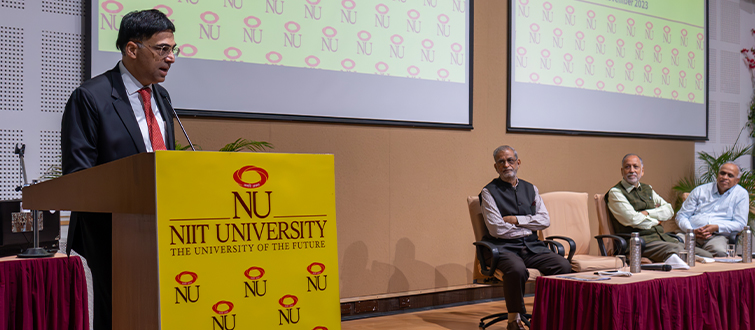Admissions Open for BTech, BBA & Integrated MBA with Deadline of 1st December 2025
- 00Days
- 00Hours
- 00Minutes
- 00Seconds

On Sunday, 26 November 2023, the NIIT University Auditorium buzzed with anticipation as chess legend Mr. Viswanathan Anand took the stage to deliver NU’s 15th Annual Lecture. Delivering a lecture on “Shaping a Beautiful Mind,” Mr. Anand’s talk delved beyond the black and white squares, offering profound insights into cultivating focus, resilience, and strategic thinking.
Anand and the Timeless Game of Chess
Chess, a game honed over centuries, for its logic and intuition traced back nearly 1,500 years, has its roots in India, where every move is calculated, making it a true test of mental agility and strategic thinking.
Mr. Viswanathan Anand, holds a unique place in Indian history. He not only became the nation’s first Grandmaster in 1987, but also ignited a chess revolution, transforming a centuries-old pastime into a national obsession. His “lightning speed and intuitive play,” as described by critics earned him five World Championships. He is considered one of the all-time greats in the world of chess. And has the eighth highest peak FIDE rating of all-time. https://ratings.fide.com/profile/5000017
Shaping a Beautiful Mind: A Continuous and Directed Process says Viswanathan Anand
World-renowned chess grandmaster Viswanathan Anand offers a fascinating perspective on shaping a beautiful mind, drawing insights from his own remarkable journey. He emphasizes that our minds are constantly sculpted by experiences, habits, and conscious efforts, and emphasizes the power we have to guide this process.
Early Influences and Lasting Lessons: Anand started his chess journey at the tender age of six, under the guidance of his mother and the vibrant environment of a chess club. This early exposure, with its mix of competitions, good habits, and even painful losses, shaped his approach to the game and life itself. Highlighting the importance of these early experiences, he stated that childhood memories can profoundly influence our choices for years to come.
Embrace Curiosity and Challenge Yourself: Emphasizing the critical role of curiosity in shaping our minds, he encouraged us to embrace the natural inquisitiveness we possess, similar to a young child’s exploration of the world. This innate curiosity, nurtured through continuous learning and stepping outside our comfort zones, paves the way for personal growth and self-discovery.
In chess, there are conventions such as shaking hands with our opponent regardless of the result and exchanging thoughts after the game. These conventions are important because the opponent is the only other person who shares the same thoughts with you about the game. A significant part of improving in chess is the discipline to keep working, often driven by the deadline of a tournament or a game the next day. However, the experiences have a far more profound effect.
Developing Habits and Redefining Comfort: Just as habits shape our chess moves, they also define our approach to life. Anand suggests consciously cultivating good habits and challenging ourselves to overcome repetitive routines. He encourages venturing into unfamiliar territory, embracing discomfort as a catalyst for growth, and training ourselves to become comfortable with the unfamiliar
As it’s repetitive and boring, we may still forget, so it’s up to us to bring in ideas of new experiences to it, doing something we haven’t done before. Instead of actively avoiding it, we should do it and train ourselves to be uncomfortable and overcome our fear.
Ultimately, Shaping Your Own Reality: Anand’s message resonates with the powerful theme: Shaping our minds is a personal journey. Our unique experiences, choices, and perspectives determine who we become. Embracing curiosity, learning from failures and successes, and actively directing our growth allow us to cultivate beautiful minds and reach our full potential.
By drawing from his own experiences as a chess champion, Viswanathan Anand offers insightful and practical advice for anyone seeking to shape a beautiful mind. His guidance transcends the chessboard, offering valuable lessons for personal growth and self-discovery, ultimately empowering us to become the best versions of ourselves.
The Legacy of the 15th Annual Lecture
The 15th Annual Lecture marks a significant milestone for NIIT University, showcasing our dedication to providing unparalleled educational experiences. Amidst these celebrations, we take immense pride in sharing that NIIT University (NU) has been ranked among the top 10 Private Universities in India by Education World in their 2022 Rankings. This prestigious recognition, a testament to the commitment of our founders, faculty, and our world-class curriculum and pedagogy, underscores our position as a leader in education, promising a bright future for our students and faculty alike.
As the university embarks on its next chapter, we carry the valuable lessons learned from chess legend Viswanathan Anand – lessons of focus, resilience, and strategic thinking. May these lessons continue to guide NIIT students and faculty on their journeys towards shaping not just beautiful minds, but beautiful futures.
To delve deeper into Mr. Anand’s thoughts on AI and its future, head over to the link provided below. There, you’ll also find insights from the Q&A session that followed his lecture, allowing you to grasp his perspective on this complex topics and relearning them, his views on staying in present, etc.